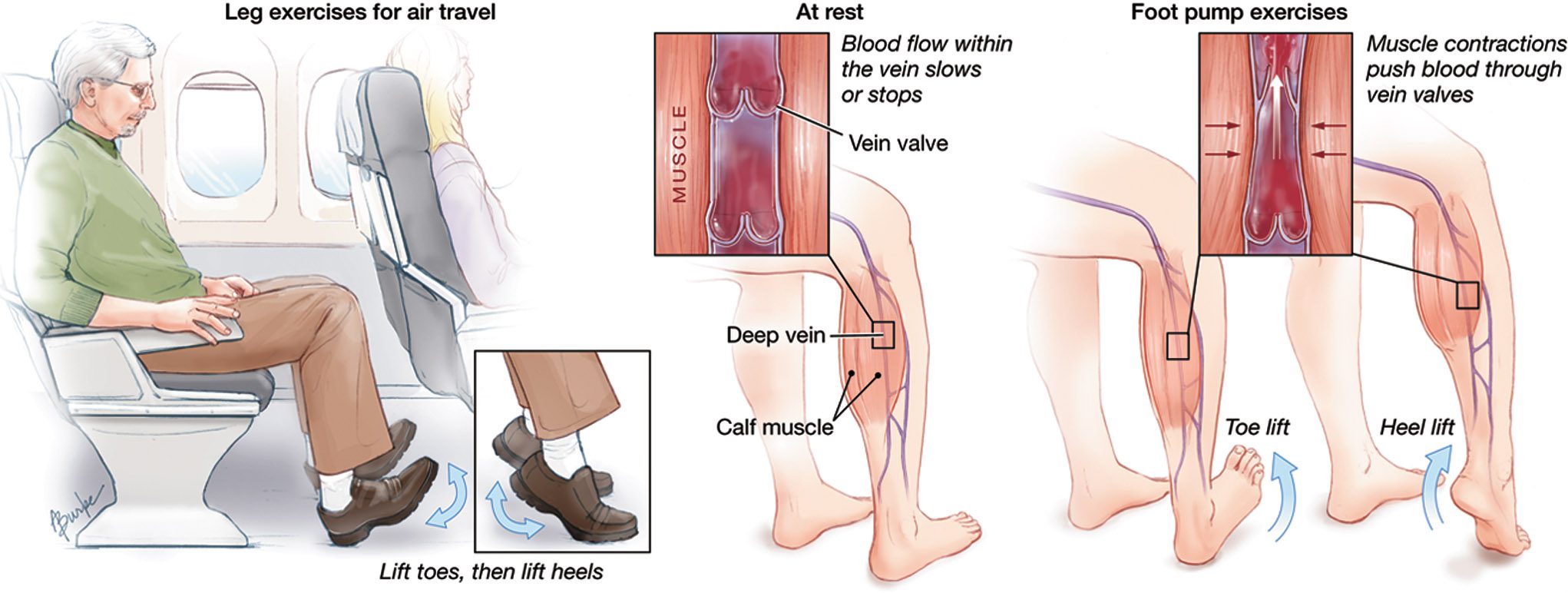By Bryan Carter, MPA-C, Phlebology-Surgery
It’s that time of year again; when we hit the road or the sky and travel for vacations, relaxing getaways, spending time with family and taking the kids or grandkids to their favorite destinations.
The hottest days are upon us during the upcoming summer months, so it’s imperative that everyone stays hydrated, especially the elderly and children. Because we come in all shapes and sizes, drinking at least ½ your body weight in ounces is the recommended amount for each person. So if you are 200 lbs., you should consume 100 ounces of water per day, which is approximately 3 liters.

If you suffer from any venous insufficiency issues, it’s critical to keep moving your toes, ankles, and calves while sitting for an extended periods of time in a car, train or when on a plane. This will help the blood to keep moving and pumping back to the heart instead of pooling into the feet. If you ever get swollen feet or legs after sitting for long periods of time, you should see your physician about ways to control your venous insufficiency and to get a full check up for your overall health.
What is venous insufficiency?
Various forms of venous issues affect 25 million Americans. Their legs are swollen, achy and they have a heavy sensation. When our veins are working properly, they pump blood back to the heart. Valves in the veins are made to open and close in one direction. If these valves or the wall of the veins are damaged, the blood is unable to work against gravity, and the result is a pooling of the blood in our legs. This pooling is called stasis and can present significant risks to our health.
Sometimes venous insufficiency is more of a cosmetic issue and poses little health concerns. This is usually noted in spider veins, which is when the tiny capillaries are damaged, but when the veins are damaged, this can cause varicose veins, which can lead to a much more severe health issues. Neither of these should be taken lightly. A medical professional will be able to report whether or not your symptoms are superficial, or dangerous and in need treatment.
Symptoms of venous insufficiency:
• Swollen legs
• Discoloration on skin (brown or red)
• Tingling/burning/itching sensations
• Heaviness
• Aching
• Cramping
One of the easiest ways to better control and improve your legs blood flow is to wear compression stockings, but beware, not all compression stocking are the same.
Sure big box stores sell them by the thousands, but they fail in comparison to medical grade and personally fitted stockings.
It’s important to understand what compression stocking do. They are tight fitting long socks that go up to your knee and create gradient pressure throughout your foot and legs to help push the blood back to the heart.
Medical grade compression stockings are measured in millimeters of mercury (mmHg). The highest compression available is 30-40 mmHg, then 20-30 mmHg, 15-20mmHg and the least or lightest compression is 8-15 mmHg.
The major differentiating factor between a medical grade stockings and the generic version is the precise measuring that is done to make certain you are wearing the appropriate compression volume. Getting the correct dimensions consist of first measuring around the smallest part of the ankle above the anklebone. Second, a measurement is taken of the largest part of the calf circumference, and lastly, at a 90-degree angle, a measurement is taken from the distance of the bend in the knee to the floor. Speaking to your physician is vital if you or a loved one have any of the venous symptoms.
Treatment Options for Venous Insufficiency Include:
• Compression Stockings
• Gradient Compression Devices
• Increased Exercise
• Medications
• Surgery (non invasive thermal and chemical ablation performed in the office)
If you have any questions or concerns call and schedule appointment today with Mr. Carter. He has been treating vein circulation problems for 15 years.
Heart of the Villages
8575 NE 138th Lane
Lady Lake , FL 32159
(352)-674-2080
Toll Free: 1-855-432-7848 (Heart 4 U)
 Central Florida Health and Wellness Magazine Health and Wellness Articles of the Villages
Central Florida Health and Wellness Magazine Health and Wellness Articles of the Villages



